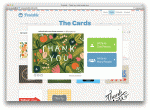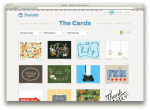
A handwritten note is becoming a lost art in the age of email, Facebook, SMS, and more messaging apps than you can count. But if anything, that rarity has only led to increase its value and perceived thoughtfulness, even as our penmanship skills decline. Today, a startup called Postable is bringing back the “handwritten” note with a service that allows you to type in handwriting fonts, then print to high-quality card stock.
Postable got its start back in 2011, when co-founders and lifelong friends Scott Potash and Jesse Blockton grew tired of all the thank you notes they had to painstakingly handwrite. However, instead of immediately launching a service that took thank you card creation to the web, they first decided to target one of the bigger hurdles with building such a service: the fact that people don’t have each others’ mailing addresses anymore.
In March 2012, the team launched a free, online address book service. “The easiest way we thought to get people’s addresses would be to ask them to give them to you,” explains Blockton. “It’s just a simple, friendly crowdsourced address book.”
This original service, which became popular with brides, new parents, and others about to send out a lot of thank yous, provided users with a custom URL (www.postable.com/name) which they could send out to friends and family along with a personal request for mailing information. Recipients would click the link, fill out a form, and later the complete address book could be downloaded in variety of formats, including Excel, as a text file, or they could just print labels directly.
This free service grew to “tens of thousands” of users, though the company won’t disclose exact figures.
Today, the second phase of the plan comes into play, as Postable launches thank you cards. At launch, there are around 100 different cards to choose from, sourced from 24 different indie designers with whom Postable has a revenue sharing deal touted to be at “double the industry standard.”
When you go to type out a card on Postable.com, you can select from one of 12 different handwriting fonts, or 10 different stylistic fonts, if you’d rather not try to give your card the appearance of a handwritten note.
The cards themselves can be printed on a few different card stocks, including Crane’s Lettra, cotton paper, and a “brown bag” recycled card.
The service itself has also been designed to make writing out your notes as easy – if not easier – than doing it by hand. After you click on a recipient’s name, Postable autofills the “dear so-and-so” portion of your note, for example, and the spacing and font size automatically adjust as you type.
Cards cost $2, plus standard postage, which is often less than the “real” cards you buy individually at the store. However, frugal shoppers know they can find packs of lesser-quality thank you cards for less at any drug store – so Postable may not work for those pinching pennies.
A number of services have stepped in to make letter-writing and card-sending more convenient for those of us whose cursive skills are largely forgotten. For example, services like Red Stamp, Sincerely, Apple’s Cards, Lettrs, Inkly, and many more help fulfill this need. But some of these services come at the space with a mobile-first mentality, in the form of an app. Postable is a bit different because it’s not targeting the one-off note jotted on the go (though that’s supported), so much as it’s going after those who have a mountain of cards to send – such as after a wedding, for example.
That tends to work better on the web, with a larger keyboard to type upon. That being said, Postable plans to release native apps in time. But for now, the service works well on iPad in the browser.
By the end of the year, the company also plans to offer a broader selection of styles and support for different occasions beyond just the “thank you” note.
Based in New York, Postable has raised $500,000 from friends and family.



